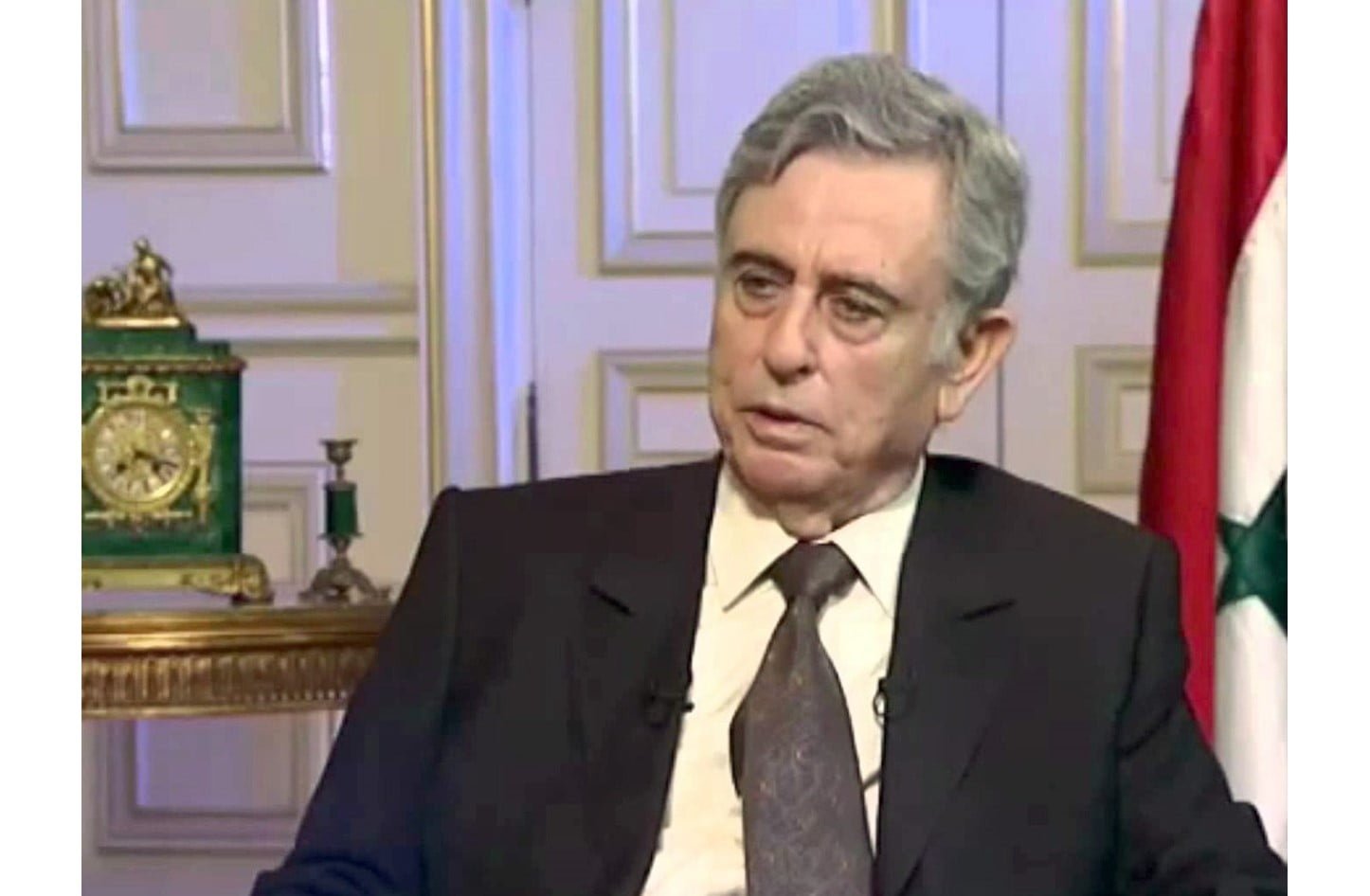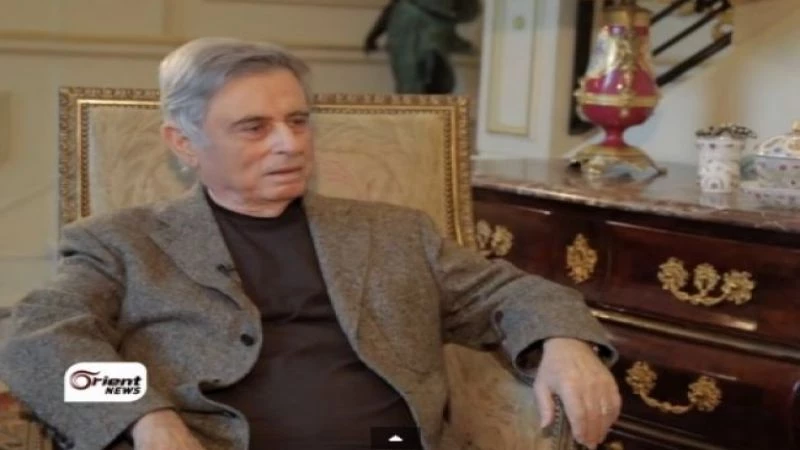Former Syrian Vice President Abdul Halim Khaddam confirmed in an exclusive interview with “Al-Sharq Al-Jadid” website that Bashar al-Assad will inevitably fall. He pointed out that Assad’s return to Damascus is a certainty, and no tyrant can remain in power indefinitely. He warned of the failure of the revolution in Syria, as in case of failure, Iran, which has ambitions in Syria, Lebanon, Palestine, Iraq, and Bahrain, and possesses sleeper cells in many countries of the Arab Maghreb, will take control of the region.
He added that “the international community has not taken a decisive stance on the conflict in Syria for reasons some of us know, and these reasons are attributed to its position on the Arab-Israeli conflict, as if there are those who want to weaken Syria so that it does not rise again within fifty years.”
Khaddam also emphasized that “when Hezbollah crosses Syrian borders and commits hostile acts against the revolution and against the Syrians, it becomes natural for the Free Syrian Army to take measures to stop such aggression.”
He explained that the problem is that “Hezbollah acts beyond its size and tries to involve Lebanon in a new problem. This is fundamentally linked not only to Hezbollah’s leadership in Lebanon but also to Iran, which uses Hezbollah as a tool in the Syrian conflict or to dominate Lebanon.”
Has the Syrian opposition turned into oppositions, and instead of working towards the fall of the regime, is there now a fear of fragmentation and weakness within the opposition?
The issue is not about fragmentation. The opposition in Syria emerged sequentially, as there was no single entity or party that planned its establishment. It started in Houran, then moved to Banias, then to Homs, and so on, spreading from one province to another, with various formations in each province. The opposition abroad was the one that started divided, and it did not create the revolution. Its role was limited to supporting the revolution internally with financial, military, and media assistance. There is no fear for the revolution as it remains cohesive internally despite some differences. The Syrian people have already covered half the way towards salvation, and they will not give up on the revolution or retreat until the regime falls and all those who committed crimes are held accountable.
Despite your extensive previous connections within the Assad regime and your influential and essential position in this regime, why do you think you were unable to penetrate the Baath Party system and work on the weaknesses that you informed people about? Or did Assad work on strengthening the weaknesses you were aware of since your defection?
The regime in Syria remains cohesive due to its social and political composition. The Baath Party did not play a significant role in all these operations, and most Baathists either joined the ranks of the revolution or refrained from interference and stayed in their homes. The fighting is done by an army that was built incorrectly and is not a national army. Its construction does not serve the interests of the country and does not align with the nature and duties of a national army.
Is the battle today considered a battle between Alawites?
No, the battle today is between the revolution and the regime, not between the revolution and Alawites. The regime, with all its components, is against the revolution, while the opposition is committed to the rights of minorities and to Syria as a whole, both its land and its people.
Regarding the statements attributed to the Free Syrian Army about targeting rocket launch areas in Lebanon, and whether the Free Syrian Army can fight on two fronts simultaneously, or if it would require intervention from Turkey or others.
It’s not a matter of fighting on two fronts but on one front. When Hezbollah crosses the Syrian borders and engages in hostile acts against the revolution and the Syrian people, it is natural for the Free Syrian Army to take measures to stop such aggression. The problem is that Hezbollah is acting beyond its capabilities and trying to involve Lebanon in a new problem. This issue is not solely related to the leadership of Hezbollah in Lebanon but also to Iran, which uses Hezbollah as a tool in the Syrian conflict and to dominate Lebanon.
Regarding the lack of arming the opposition by the European Union and the United States, is it aimed at prolonging the crisis to achieve Syria’s division, or is it related to Western concerns about the rise of extremist Islamic influence willing to destabilize Israel under the authority of religious clerics?
The pretext of Islamic influence is not acceptable. The Syrian people are being killed while the West stands idly by and takes no action, while in Libya, measures were taken within a week. If there is any growth of extremism in Syria, the primary responsibility lies with the international community and the Arab countries, who remained silent for a long time. Today, the US Secretary of State is flirting with Bashar al-Assad. I confirm that there is no Islamic extremism in Syria; our people in the region practice their religious beliefs, whether they are Muslims or Christians. In any conflict over a homeland, religions intervene, just like what happened when France went through a difficult stage and the church supported the resistance in France. When a citizen is humiliated, his dignity violated, and he sees that the international community is not on his side, who will he turn to? I warn that if the revolution in Syria fails, Iran, with its ambitions in Syria, Lebanon, Palestine, Iraq, Bahrain, and its sleeper cells in many countries of the Arab Maghreb, will take control of the region. The international community has not taken a decisive position on the Syrian conflict for reasons some of us know, and they attribute these reasons to their position on the Arab-Israeli conflict, as if someone wants to weaken Syria so that it does not rise again for fifty years.
Where do you stand today within the Syrian opposition, and do you consider yourselves close to returning to Damascus?
I was the first Syrian to work towards overthrowing the regime and defected in a position where I spoke about everything. I am still working for the liberation of Syria, and today I am at the heart and core of the opposition. I focus on working inside Syria and with the opposition inside the country with all my capabilities. The return to Damascus is inevitable, and no tyrant can continue to rule.



